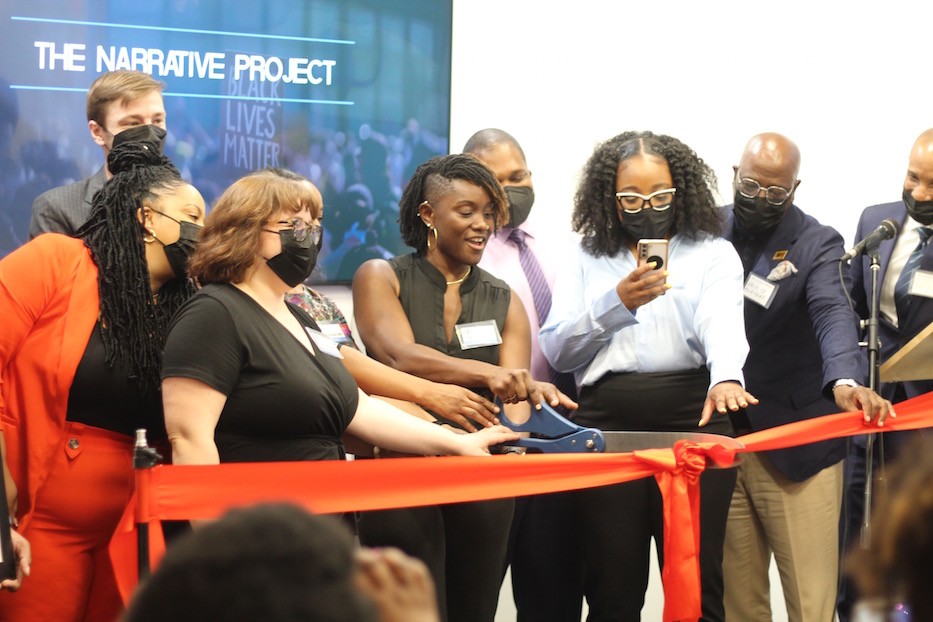
Culture & Community | Downtown | Storytelling | Arts & Culture | Arts & Anti-racism
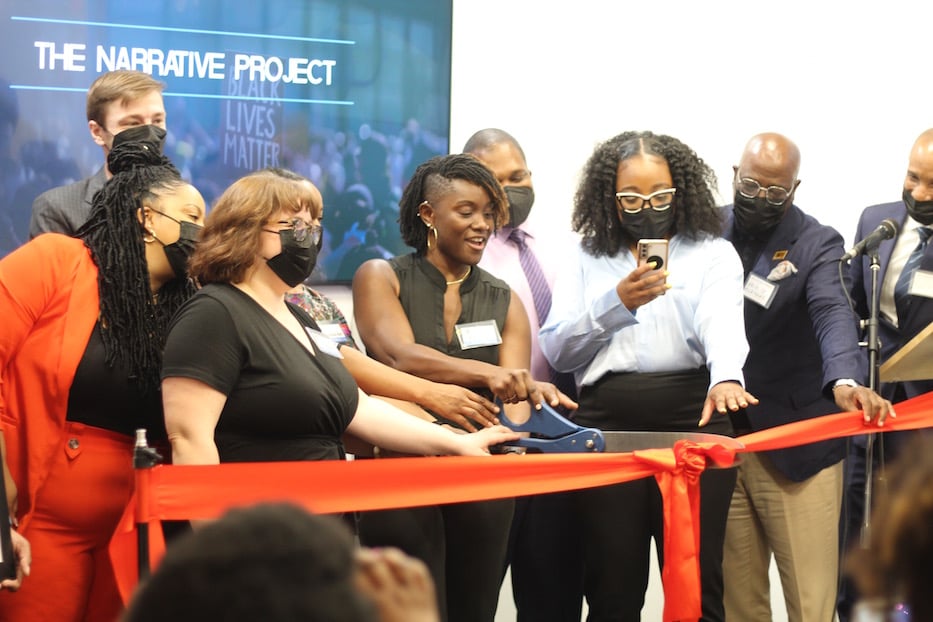
Members of The Narrative Project cut the ribbon on their 7,500 square foot Temple Street offices. Lucy Gellman Photos.
A pioneering, anti-racist public relations agency cut the ribbon on its downtown New Haven home—and promised to take its work across the country in the next 10 years.
In the process, it never wants to lose sight of the community that helped launch it into being.
That was the story at The Narrative Project (TNP) Monday night, as employees, partner organizations, and Founder and Executive Director Mercy Quaye cut a large red ribbon on the agency’s 7,500 square foot offices at 142 Temple St. downtown.
Seven years after TNP began as a discussion series—and three years into its time as a formal agency—it has grown from two staff members and four anchor partners to 15 employees and over 30 statewide partners. Over 100 people attended Monday’s ribbon cutting.
Over the course of the night, both Quaye and TNP Account Manager Aaron Johnson spoke about the organization’s 10-year plan, which includes expansion to Washington, D.C., Los Angeles, and Chicago.
“Anti-racism isn’t just about talking, right?” Quaye said as she took the mic. “It’s about doing.”
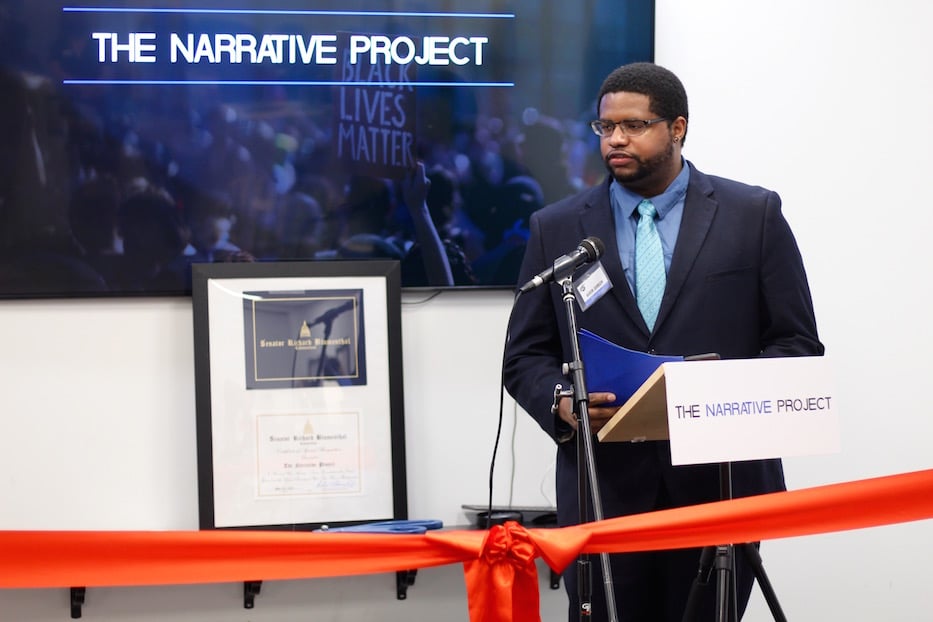
Aaron Johnson.
The Narrative Project began informally in 2015, when Quaye kicked off a series of talks exploring the intersection of race, gender, and social justice across the city. At the time, she was working for Connecticut Coalition for Achievement Now (ConnCAN), and saw a need for dialogue in the community. “There had been another shooting of an unarmed Black man,” she remembered Monday. “I do not know which one, which is part of the point, right?”
The more conversations she started, the more organizations reached out, asking her to do a training session, facilitated dialogue, or narrative workshop onsite. In 2016, a still-nascent TNP organized around the state-sanctioned murders of Alton Sterling and Philando Castile, holding a “Die In” on the New Haven Green. From those discussions, it grew into social justice film screenings, privilege walks and panel discussions.
Quaye, meanwhile, navigated positions at the New Haven Board of Education, Educators for Excellence, WNHH Community Radio and Hearst Media Group. She now helms the community editorial board at the CT Mirror, where she co-hosts the podcast “Untold” with John Dankosky.
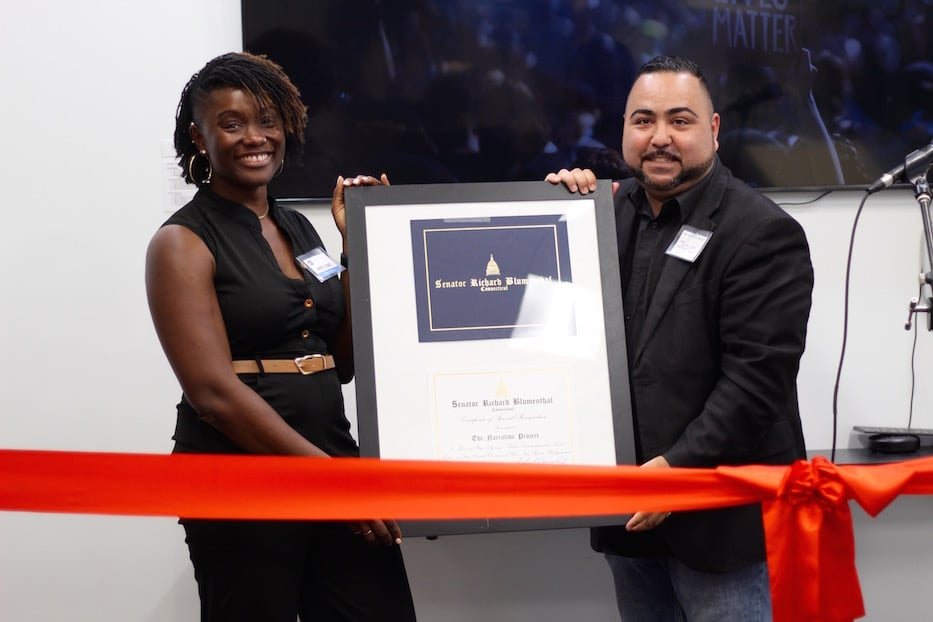
Mercy Quaye and Joe Rodriguez, deputy district director to U.S. Sen. Richard Blumenthal. "I'm a firm believer in our accomplishments as Black and Brown young professionals," he said.
In 2019, she formally launched the agency from The State House, in a discussion with New Haven Independent Editor Paul Bass. The group’s first partners included the Connecticut Center for Arts & Technology (ConnCAT) and its for-profit subsidiary ConnCORP, CT Core-Organize Now!, Connecticut Voices for Children, Connecticut Juvenile Justice Alliance, and Take Action Running. After starting on Church Street, the agency moved to Temple Street a year ago.
Across its offices Monday, attendees chatted, caught up with each other, signed a poster board “guest book” and nibbled on catering from Sandra’s Next Generation. In a repurposed conference room, the agency’s core values stood out in blue and black paint against a makeshift bar and bottles of seltzer and soda. They include leading with anti-racism, working collaboratively, searching for new or unconventional solutions and doing “the right thing,” even when it may not be the fastest or easiest way.
“We don’t have clients,” Quaye said to applause and a few knowing laughs from her colleagues. “We have partners. We have this saying: ‘We like to do things right, not rushed.’ Doing anti-racist work requires you to slow down. It requires you to be introspective.”
Throughout the night, both TNP staff and partner organizations applauded the agency for creating new ways to talk about education, housing, economic development, reproductive rights, healthcare, food justice, immigration and environmental racism, among other topics. From state and national legislators to funeral home director Howard K. Hill, each thanked the group for expanding the dialogue around anti-racism without even having to say the word.
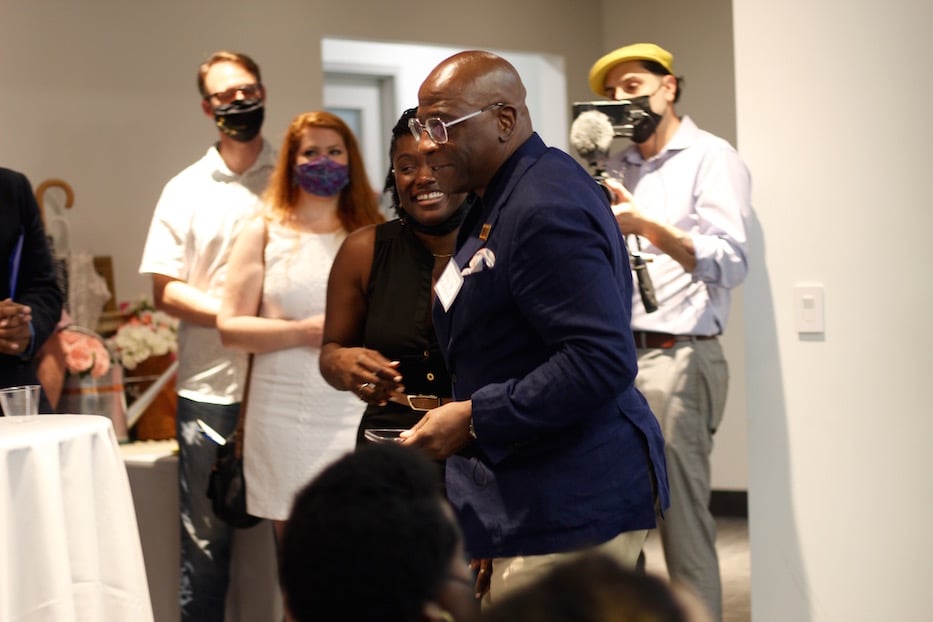
Erik Clemons, who thanked TNP for helping him tell ConnCAT and ConnCORP's stories.
As one of the first partners to sign on in 2019, ConnCORP CEO Erik Clemons praised not only how far the agency has come, but the very core of the work that it does. Three years ago, he was leaving the Graustein Memorial Fund’s Hamden offices when Quaye walked in and headed his way. By then, the two had known each other for years.
“Who is telling ConnCAT’s story?” he remembered her asking.
He was taken off guard. Clemons paused to think about the response. The answer was no one, he said after a beat. No one was telling the story of ConnCAT in the way that Clemons wanted to tell it, he continued. Around him, it also seemed that no one was telling the story of people most affected by social stratification, food insecurity, poverty, and unemployment. That was particularly true when they were Black, he said.
He put his faith in Quaye to tell that story. Three years in, TNP has guided ConnCAT and ConnCORP through ribbon cuttings, flag raising ceremonies, large community discussions, and community resource drives. While Clemons knows that it’s a team effort, he singled out Quaye as an especially visionary leader.
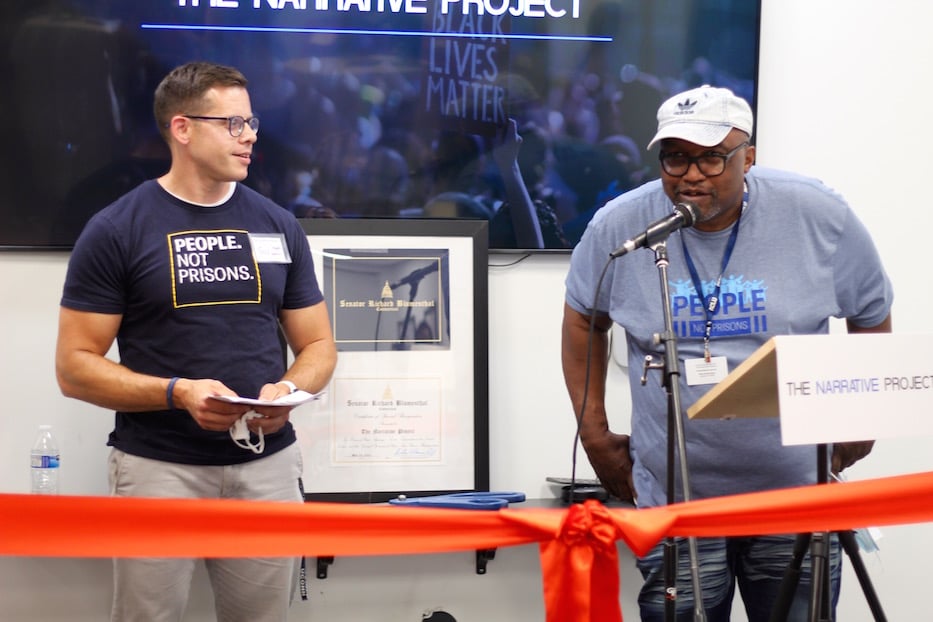
ACLU CT Smart Justice Field Organizer Gus Marks-Hamilton and Senior Policy Organizer Anderson Curtis.
On a large monitor behind him, a pair of hands lifted a sign that read “Black Lives Matter” in clear, crisp text. On the walls, photographs peeked out from partners including Planned Parenthood of Southern New England and ConnCAT. Senior Social Media and Design Manager Hannah Hurwitz buzzed around the room with her camera.
It was a fitting setting for representatives of the American Civil Liberties Union (ACLU) of Connecticut, which partnered with The Narrative Project as it rolled out communications around its support of police accountability, carceral reform, cannabis legislation, and evolving “Smart Justice” initiative. Taking the mic, Senior Policy Organizer Anderson Curtis brought the audience back to his start at the organization, when he was new to the role and unsure of how to communicate.
“I came to this work seeking change,” he said. “I came to this work seeking to change my life.”
The Narrative Project helped him do that. In his work, Curtis dedicates his time to peer support and recruiting leaders who have lived experience with the carceral system. A lot of that work, he said, relies on close listening and trust building. He noted how a failure to communicate—like one in Cool Hand Luke, with which he broke the ice—"can jam up a lot of things.” In a room full of communication professionals, it got a laugh.
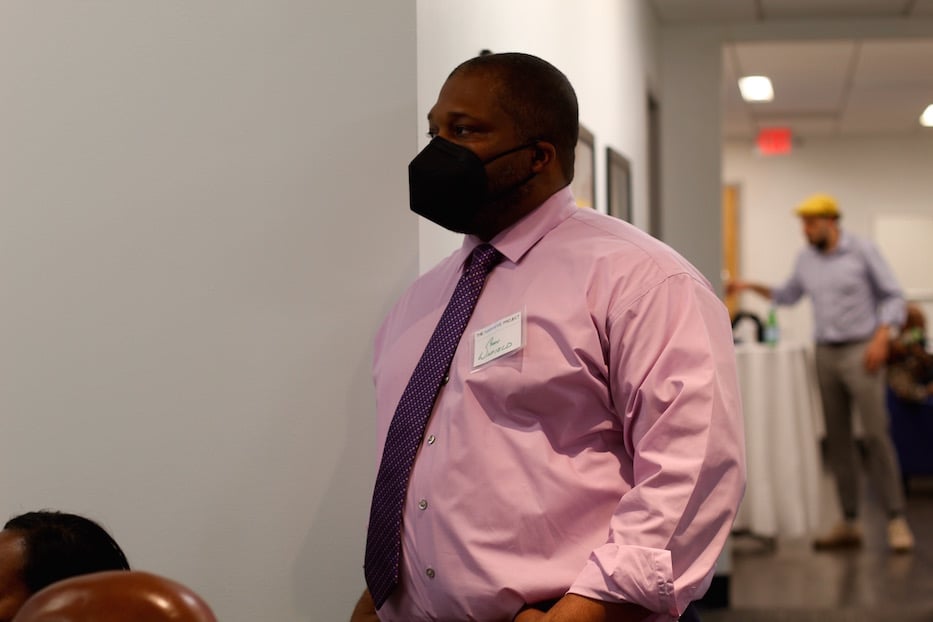
State Sen. Gary Winfield.
State Sen. Gary Winfield, whose long advocacy for police accountability and significant prison reform predates his time in office, also lauded the agency for pushing an ant-racist communications strategy that can influence policy and change minds.
“Everything that we do, race has an impact on,” he said.
That sense of transformational work—rather than a transactional approach—extended to employees. Johnson, a former reporter with the Waterbury Republican-American, remembered walking into TNP in October 2020, and realizing what a rare workplace he had found. His colleagues looked like him. He felt suddenly free to express himself in a way he never had in a newsroom. Quaye, at the center of it all, dropped lyrics from Hamilton. And that was just his first day.
Something clicked into place. He would later tell people that “Mercy plucked me from obscurity.”
When his parents visited a few weeks later, he remembered watching “the pride they had when they looked at this office.” During a tour of the office, and then during lunch, and then during a train ride into New York, the two talked about how excited they were to have him working for Quaye, a strong, independent Black woman in whom they saw a reflection of themselves.
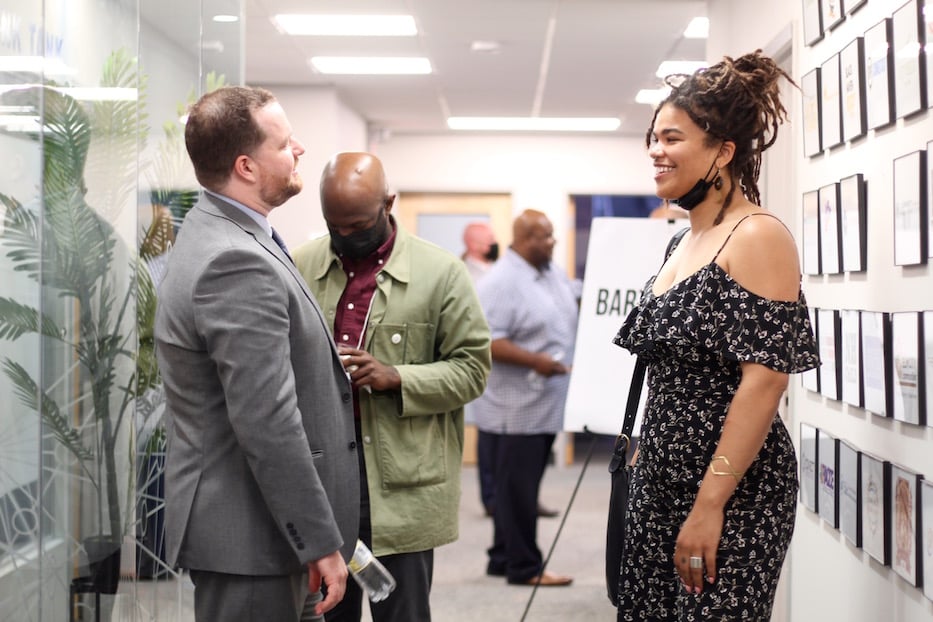
He pointed to Quaye’s RAISED (Research, Action & Acknowledge, Interrogate, Sample, Enhance, Deliver) framework, which adds an intentional, anti-racist lens to every communications project TNP takes on. In addition, he said, TNP strives to feel like “the living room of the community,” particularly as the new offices open formally.
That doesn’t just mean comfort, he said—his grandmother’s living room was home base for intimate, confidential, sometimes difficult and necessary discussions.
“This is a place for all of us to come together and do the work,” he said. “We will continue to be storytellers for good.”
Part of those discussions is growing TNP’s footprint to three new American cities, said Quaye. In the next decade, she intends to grow the agency to Washington, D.C., Los Angeles, and Chicago. New Haven, where she was born and raised, will remain TNP’s founding location and central hub.
She has identified each for their own reasons, she said—but believes that all of them share “a need for deep storytelling from the perspective of impacted people.”
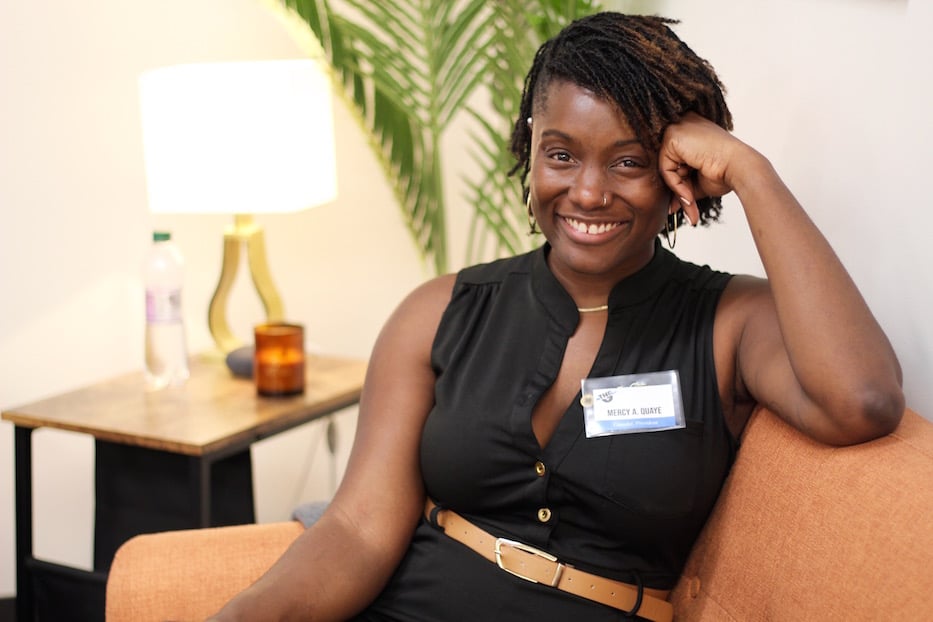
In D.C., she sees an imbalance of power created by the city’s lack of statehood, which translates to a contemporary version of taxation without representation. In L.A.—a megacity “with a million issues” that sprawls 502 square miles to New Haven’s 18.7—she’s acutely aware of how a changing climate will (and already has) disproportionately affect Black people, Latino people, Indigenous people, Asian Americans and Pacific Islanders, queer folks, and those living under an umbrella of poverty and housing insecurity.
Chicago, which is poised as the fourth city to come on board, “is the story of a community deferred,” she said. She doesn’t see people with lived experience telling the story of education, housing, gun legislation, the opioid crisis and the carceral system in Chicago. She also wonders about the stories of joy that the country is missing, she said. She referenced a keynote from Lena Waithe, in which the actress left her thinking about how to balance the narrative of a city’s pain with that of its joy.
For Quaye, it’s as personal as it is professional. As a kid, she said Monday, she made some of the same decisions that landed her peers in teachers’ offices, school detention, and later in prison. She was caught shoplifting at the mall. A neighbor called the cops on her and her sister after one particular sibling fight got loud. She’s ridden in the back of a police car. The difference, she said, is people gave her chances that they didn’t give many of her peers.
“I am a product of New Haven through and through,” she said. “Everything that has gotten me here, sure, is preparation, but also chance. And I think that that is the only thing that separates me from my peers who went to prison. We were all prepared in the same exact way.”
“It is sheer chance that the same community produces folks who succeed and folks who don’t,” she said. “And what I want for New Haven is more chances.”
Learn more about The Narrative Project here.

